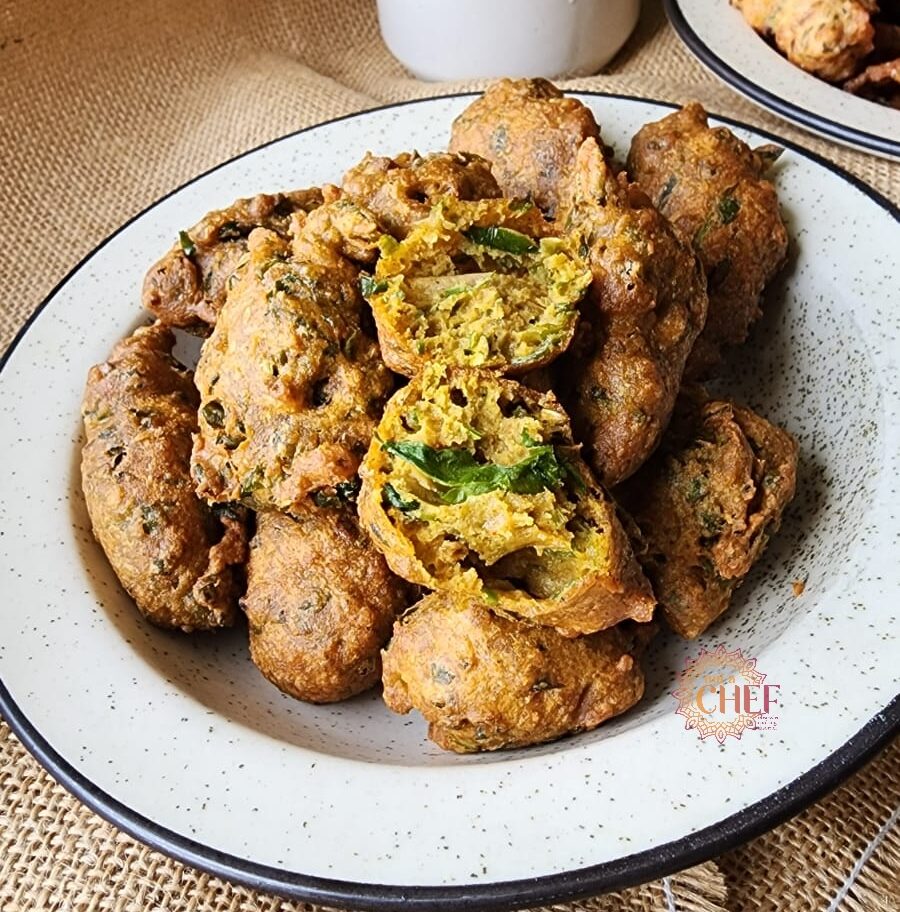
Gujarati winters are full of bajra, or pearl millet, and green garlic, and these seasonal ingredients keep you warm and can tide you through many a chilly day. This dish is great with tea, or as part of a meal, and I would love for you to try the recipe out.
For the gota
| Water | As required |
|---|---|
| Oil, to fry | ½ litre |
| Oil, for the batter | 1 teaspoon |
| Lemon | Half |
| Baking soda | ⅛ teaspoon |
| Salt | To taste |
| Turmeric powder | ¼ teaspoon |
| Red chili powder | ½ teaspoon |
| Dry coriander, coarsely ground | 1 teaspoon |
| Ginger, chopped | ½ inch |
| Garlic green chilli paste | 1 teaspoon |
| Fresh garlic, chopped | 3 tablespoons |
| Methi leaves, chopped | 1 cup |
| Besan | 2 to 3 tablespoons |
| Bajra flour | 1 cup |
For the chutney
| Coriander leaves, chopped | A few sprigs |
|---|---|
| Sugar | ½ teaspoon |
| Curd | ½ cup |
| Salt | ½ teaspoon |
| Red chilli powder | 2 teaspoons |
| Green chillies, chopped | 2 to 3 |
| Garlic cloves | 7 to 8 |
What You Will Need
Mixing bowl, mixing spoon, mortar and pestle, and frying pan.
Spread paper towels on a tray to drain oil from the pakodas after they are fried.
Instructions
In a large mixing bowl, add the bajri flour, besan, chopped chili, ginger, garlic, methi leaves, oil and the spices.
Then add baking soda and squeeze lemon for it to activate.
Whisk the ingredients well to make lump-free thick batter.
Heat oil in a kadhai.
Form small balls with the batter and drop it into hot oil forming small balls.
Stir occasionally, to make sure the pakodas don’t burn.
Once they turn golden brown, you can take them out of the kadai, and lay it on the tray to drain excess oil.
To prepare the red chutney, pound garlic, green chili, salt and red chili powder in a mortar and pestle. Mix 1 tablespoon of the paste into the curd, and top it with chopped coriander leaves.
Serve the hot Bajri Methi Gota with the red chutney.
Notes and Tips
I always add 1 cup of green garlic to the batter in winter; I like using seasonal ingredients.
If you make this in summer, you can replace bajra flour with that of jowar (sorghum), the millet of the season.
For frying, I use an iron kadai, which makes the gota more flavourful.
Remember to keep the flame on high while you are putting the gota into the kadai, and then reduce the flame to between low and medium as you continue to fry it. This way, it’s crispy on the outside as well as cooked well within.
The lockdown brought out a passion in Hetal Chheda: cooking. She has always found cooking to be a creative pursuit, even therapeutic. She likes to stay true to timeless dishes, while experimenting with new ones. She’s the first to say she’s no chef, but she’s no average cook either! You can find her on Instagram @not.a.chef_
 This recipe is part of the Millet Revival Project 2023, The Locavore’s modest attempt to demystify cooking with millets, and learn the impact that it has on our ecology. This initiative, in association with Rainmatter Foundation, aims to facilitate the gradual incorporation of millets into our diets, as well as create a space for meaningful conversation and engagement so that we can tap into the resilience of millets while also rediscovering its taste.
This recipe is part of the Millet Revival Project 2023, The Locavore’s modest attempt to demystify cooking with millets, and learn the impact that it has on our ecology. This initiative, in association with Rainmatter Foundation, aims to facilitate the gradual incorporation of millets into our diets, as well as create a space for meaningful conversation and engagement so that we can tap into the resilience of millets while also rediscovering its taste.

Rainmatter Foundation is a non-profit organisation that supports organisations and projects for climate action, a healthier environment, and livelihoods associated with them. The foundation and The Locavore have co-created this Millet Revival Project for a millet-climate outreach campaign for urban consumers. To learn more about the foundation and the other organisations they support, click here.
You must be logged in to rate this recipe.

Sign in with email
